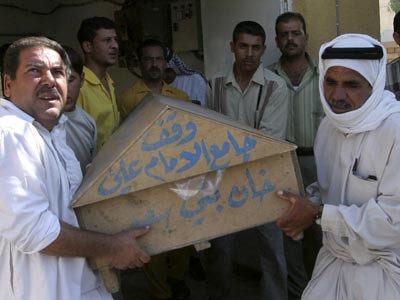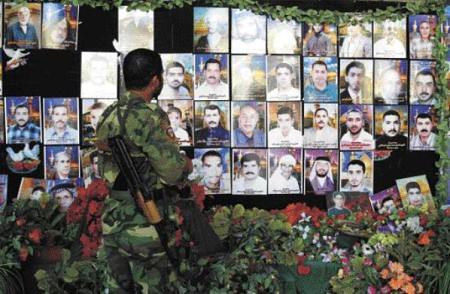
So, flypaper strategy, huh.
Okay, so anyone still convinced that the war in Iraq is going to save the rest of the world from the scourge of terrorism might want to pour a cup of lukewarm tea and sit down before continuing. You ready? Okay. The State Department's 2006 Country Reports on Terrorism, released yesterday, shows that worldwide, terrorism has increased by a whopping 25 percent, that al-Qaeda remains "the most immediate national security threat to the United States," and that Iraq reported a 300 percent increase in terrorism. A total of 74,217 civilians became the victims of terrorism in 2006.
Kind of throws the "flypaper strategy" concept into a whirl.
The report does show that terrorism outside of the Middle East and Southeast Asia is on the decline, with only Cuba and Venezuela significantly supporting terrorism from the western hemisphere. But the government's claim that our actions in Iraq aren't contributing to the creation of new terrorists is belied by the fact that terrorist incidents in Iraq nearly doubled in the past year and incidents in Afghanistan increased by 50 percent. Nonvehicular suicide bombings rose 25 percent. Incidents trend toward more sophisticated and better coordinated attacks.
I don't know, really, what the US is doing in Iraq, because the government has not felt it necessary to share their plan with the American people, or even to give anything beyond a verbal confirmation that a plan exists at all. Whatever was working so well before has been reinforced as Bush surged more troops, and then even more troops. And in the grand traditon of doin' what he's doin', Bush has continued to get what he's gettin'.
So here's what hasn't happened. Osama bin Laden hasn't been captured, and al-Qaeda hasn't been weakened. Iraq has held democratic elections, but its democratically elected prime minister hasn't done anything to indicate his intent to take over responsiblity for Iraq from the US. Muqtada al Sadr hasn't been convinced that he's not in charge, and his militias haven't been disarmed. Maliki has purged Iraqi security officials for combatting said militias too aggressively, and the Pentagon has decided that training Iraqi troops isn't the priority it once was, so I guess that's something.

Doug has the question of the day: If this is the progress that we're making in Iraq, what is wrong with timetables? What is wrong with holding the Iraqi government to account for their failure to govern Iraq - and to hold the US government to account for their failure to accomplish freaking anything since "Mission Accomplished" was declared four years ago? What is it about the Bush administration's "keep chugging, give it a chance to work" strategy that they think will provide impetus for the Iraqi government to start taking responsibility?
I truly believe that, once upon a time, Bush thought he was doing a good thing. I don't know about his motives; maybe he was trying to avenge Saddam's threats against Bush Senior, maybe he was just trying to establish a legacy of Global Peacemaker to follow him into history. But at this point, it's apparent - obvious, even - that he's just trying to slow-walk the Iraq conflict until his term is up and it's not his problem anymore. It's a precariously balanced sinkful of dishes, and if he can just not touch anything, it may just hold for the next year and a half.
What's more, Bush has backed himself into a corner where he can't pull out. He and his friends in government and media have so thoroughly associated redeployment with cowaradly retreat and surrender that even if he acknowledged that it's actually a good strategy and wanted to do it, he couldn't without losing face and shattering the legacy. He's the Decider, and his decision has been made. The difficult step, redeployment, will have to happen sooner or later, but Bush will be safely out of the way.
The State Department's report shows that, whatever the administration has been hoping to accomplish in Iraq, it has not made things any better. One can project from this that, if the current strategy remains in place, things will continue to not get any better and will likely get worse. The Democrats' plan for troop withdrawal may not be perfect, but it's the only plan out there right now that removes the troops from harm's way and gives Maliki and the Iraqi government a reason to start getting their stuff together. And as an added bonus, it frees American troops to address rising threats elsewhere, like al-Qaeda - which has been spreading and growing far and wide as US efforts remain myopically focused on Iraq.
It's a cliche because it's true - if at first you don't succeed, try, try again. But then try something else. There's no reason to be stupid about it.
No comments:
Post a Comment